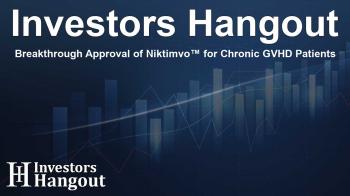Breakthrough Approval of Niktimvo™ for Chronic GVHD Patients

Niktimvo™ Achieves FDA Approval for Chronic GVHD
In an exciting development for patients suffering from chronic graft-versus-host disease (GVHD), Niktimvo™ (axatilimab-csfr) has received approval from the U.S. Food and Drug Administration (FDA). This groundbreaking treatment represents a significant advancement, targeting the colony stimulating factor-1 receptor (CSF-1R), which is crucial for controlling inflammation and fibrosis in affected patients.
Overview and Launch Timeline
Incyte (NASDAQ: INCY) and Syndax Pharmaceuticals (NASDAQ: SNDX) have announced that they expect to launch Niktimvo in early February for patients weighing at least 40 kg. This medication becomes the first FDA-approved therapy aimed specifically at addressing chronic GVHD, an ailment that occurs when transplanted immune cells attack the host’s organs.
Clinical Data Supporting Approval
The approval is backed by pivotal data from the AGAVE-201 trial, demonstrating Niktimvo's effectiveness in yielding durable responses across all patient demographics and organ systems involved. During the trial, a remarkable 75% of patients receiving 0.3 mg/kg doses biweekly experienced significant improvement after six months of treatment.
Expert Insights on Niktimvo
Hervé Hoppenot, the CEO of Incyte, expressed enthusiasm about the launch, emphasizing the commitment to the chronic GVHD community. Niktimvo has shown exceptional potential in helping patients for whom previous treatments have not been effective. Collaborating closely with Syndax, Incyte aims to leverage its extensive knowledge and relationships within the clinical care community to support a successful introduction of this innovative medicine.
Understanding Chronic GVHD
Chronic GVHD is a life-altering condition that presents a unique challenge following allogeneic stem cell transplants. With estimates suggesting that about 42% of patients develop chronic GVHD, there is a pressing need for more treatment options, especially for those whose conditions do not improve with existing therapies. Nearly half of these patients require three or more lines of treatment, underscoring the demand for effective solutions like Niktimvo.
The AGAVE-201 Trial: A Closer Look
This global study involved 241 patients who had recurrent or refractory active chronic GVHD. The patients were assigned to receive different doses of Niktimvo, and the outcomes were meticulously measured against established criteria. The results highlighted the drug’s potential, leading to its rapid development and approval.
Potential Risks and Safety Information
As with any new medication, Niktimvo comes with risks. Serious adverse reactions were reported in 44% of participants in the trials, with the most common issues being infections and respiratory complications. These findings highlight the importance of monitoring and preparedness among healthcare providers to manage potential side effects effectively.
Accessibility and Support Initiatives
Incyte and Syndax are dedicated to ensuring that patients have access to Niktimvo without barriers. Their IncyteCARES program provides tailored support, including financial assistance and educational resources, to eligible patients prescribed Niktimvo.
Future Directions for Niktimvo and Its Developers
The inclusion of axatilimab-csfr in the latest NCCN Clinical Practice Guidelines reinforces its importance in chronic GVHD treatment. With co-commercialization efforts in place by both Incyte and Syndax in the U.S., the companies seek to leverage their collaborative strengths to enhance patient outcomes and expand the treatment landscape.
Understanding the Mechanism of Action
Niktimvo functions by effectively blocking the CSF-1R, which plays a crucial role in the immune response during GVHD. By alleviating the inflammatory process, Niktimvo not only aims to improve symptoms but also seeks to reduce the long-term complications associated with chronic GVHD.
Frequently Asked Questions
What is Niktimvo used for?
Niktimvo is approved for treating chronic graft-versus-host disease (GVHD) in patients who have not responded to at least two prior lines of systemic therapy.
How does Niktimvo work?
Niktimvo blocks the CSF-1R, which reduces inflammation and fibrosis in patients with chronic GVHD.
What should patients expect from the treatment?
Patients can expect a unique therapeutic approach targeting the underlying causes of chronic GVHD, potentially leading to improved outcomes.
How is the dosing regimen for Niktimvo structured?
The recommended dose for adult and pediatric patients is 0.3 mg/kg every two weeks, up to a maximum of 35 mg per session.
Are there any serious side effects associated with Niktimvo?
Yes, patients may experience serious adverse reactions, including infections and respiratory complications, necessitating close monitoring during treatment.
About Investors Hangout
Investors Hangout is a leading online stock forum for financial discussion and learning, offering a wide range of free tools and resources. It draws in traders of all levels, who exchange market knowledge, investigate trading tactics, and keep an eye on industry developments in real time. Featuring financial articles, stock message boards, quotes, charts, company profiles, and live news updates. Through cooperative learning and a wealth of informational resources, it helps users from novices creating their first portfolios to experts honing their techniques. Join Investors Hangout today: https://investorshangout.com/
Disclaimer: The content of this article is solely for general informational purposes only; it does not represent legal, financial, or investment advice. Investors Hangout does not offer financial advice; the author is not a licensed financial advisor. Consult a qualified advisor before making any financial or investment decisions based on this article. The author's interpretation of publicly available data presented here; as a result, they should not be taken as advice to purchase, sell, or hold any securities mentioned or any other investments. If any of the material offered here is inaccurate, please contact us for corrections.
